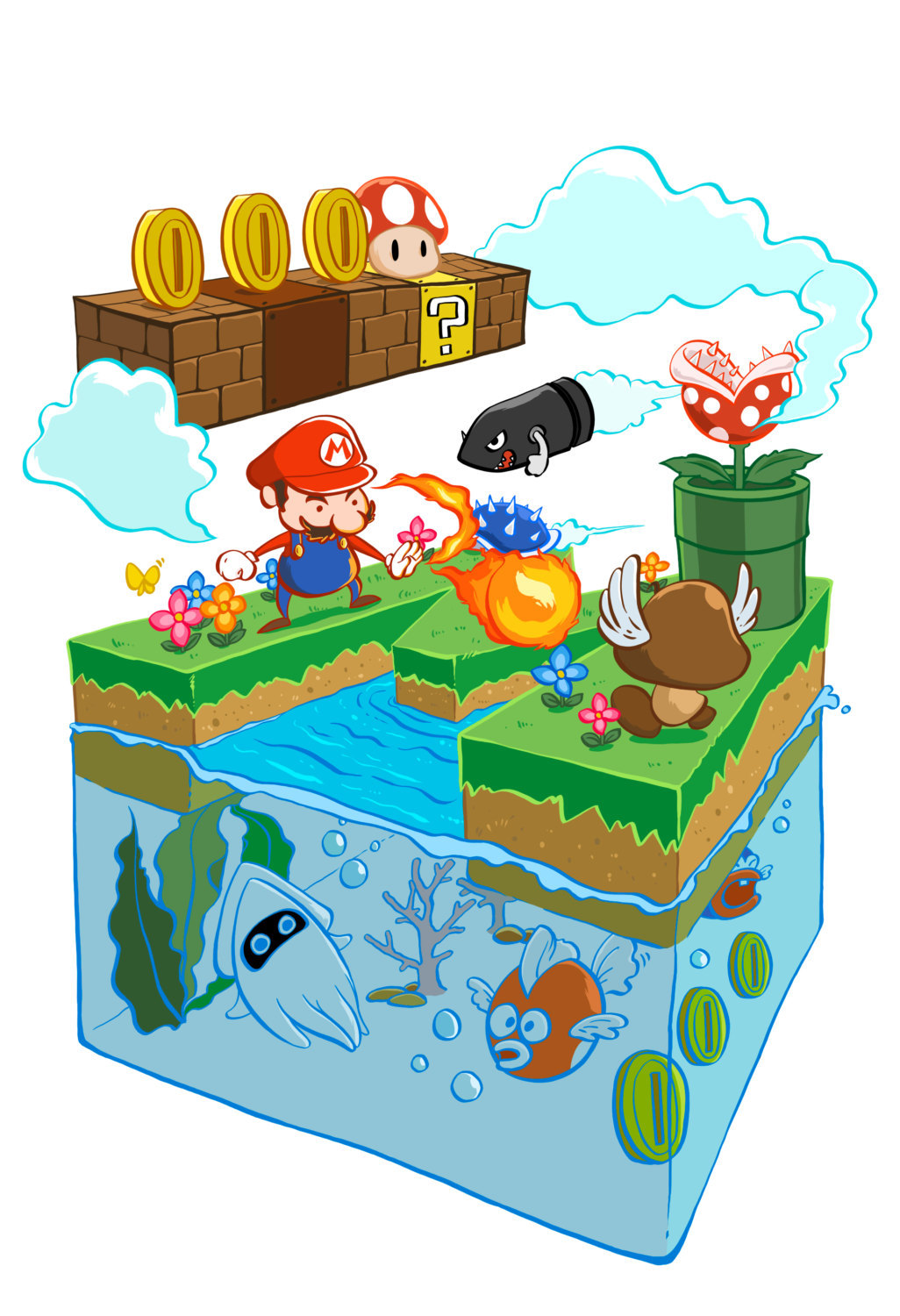"Super Mario" by PenelopeLovesPrints
Prints available for purchase from Etsy. US$7
7 cool text games with less than 300 words.
Bob Mackey points out how Nintendo white-washes Yokai Watch and downplays elements of the Shinto religion.
Brad O’Farrell on how the geography of Pokemon is based on real-world countries, including Japan, and how that geography influences the game's plot.
The brainchild of Hidetaka Miyazaki and his team at From Software, the Souls games have gained a rabid cult following over the past few years. The newest spiritual successor Bloodborne (trailer) has been out for a couple weeks now, and it's received stellar reviews across the board. It might very well be the best in the series, reconfiguring the dense gameplay in surprising ways and offering up an intricately-realized Victorian gothic world. Tim Rogers has written a lengthy, articulate, spoiler-free (in a narrative sense) analysis of Bloodborne's design - You Are the Experience Points. George Weidman at Super Bunny Hop covers Bloodborne’s relationship to H.P. Lovecraft as expressed through the mechanics and lore of the game. Aevee Bee discusses Bloodborne’s worldbuilding, and Tim Rogers goes full Tim Rogers on the design of the game. YouTube user EpicNameBro offers a good sense of what the games is all about in his Bloodborne Let's Play videos, but even those who have finished the game shaven't unraveled all of the game's secrets yet.
David Carlton compares Dragon Age: Inquisition with the simplicity of Ico.
Edwin Evans-Thirlwell wonders Why Do Video Games Love Killing the Planet?
Ian Williams discusses the history and murky future of Warhammer.
In response to a group of headteachers who threatened to report parents who let their children play 18-rated games, an anonymous teacher has written an article on Eurogamer contextualising the letter both in terms of why headteachers felt it was necessary and how games are affecting children in class.
Jetta Rae of Ravishingly contends that Pinball May Be The Most Inclusive Gaming Space For Women. I didn't realize Pinball machines were still a thing, so this took me by surprise, but you can check out Pinballmap.com to find a suitable arcade near you, if you'd like to give it a try.
Jorge Albor discusses about decision making in Life is Strange and Game of Thrones:
Kaitlin Tremblay reflects on what she learned from Tifa playing Final Fantasy 7.
Keith Burgun offers his definition of "games" vs his definition of "toys"
Ken Levine, of System Shock and BioShock fame, explores player driven replayable narrative gameplay.
"It's clear that narrative is an important part of video games and something that the audience deeply relates to. However, the strengths of interactive media are player participation, the ability to experience content in different ways on different playthroughs and the fact that the content is not static. It's time for narrative to deeply embrace these elements."Larry Land crunches the numbers and discover that Running your own high-end cloud gaming service on EC2 is actually quite economical.
"Playing games this way is actually quite economical – especially when comparing to purchasing a full-on gaming rig. Here are the costs you’ll need to consider: GPU Instance runs about $0.11/hr (on a Spot instance, regularly around $0.70/hr) Data transfer will around $0.09/GB, and at a sustained ~10mbit, itll cost you $0.41/hr (4.5GB/hr) This comes out to around $0.52/hr, not bad, for the cost of a $1000 gaming pc, you get ~1900 hours on much higher-end hardware!"Laura Hudson on using Telltale's The Walking Dead to teach applied ethics.
Mike Mahardy outlines the history of Looking Glass Studios.
Over at Not Your Mama’s Gamer, Alisha Karabinus looks at the array of characters in State of Decay and how they avoided design tropes.
Nathan Ditum spent some time with Dying Light and found a bridge that reminded him of the possibilities of videogames.
Noah Caldwell-Gervais has a hour video critically examining every Call of Duty game.
PC Gamer's Chris Livingston has been playing Pillars of Eternity as a part of bears.
"a long time ago a very wise in-flight magazine told me that success is a journey, not a destination. Here’s how I tried to complete a quest in Pillars of Eternity as a bunch of bears, and almost actually did it."A prototype of Sound Fantasy, a long-lost Super Nintendo music game by Electroplankton auteur Toshio Iwai, has surfaced online and is now available to download. Sound Fantasy later evolved into the PC program SimTunes.
Simon Parkin characterizes Adderall as "a stimpack for gamers" in his piece on drug abuse in eSports, which sounds absurd until you consider how many eSports are reflex and concentration based and how quickly those things fade as you age.
At Vice, Max Wallis enumerates Six Ways in Which 'Pillars of Eternity' Is Incredible.
The whole slippery business of video game archiving and its layers of tangled up rights ownerships and baffling legal obfuscation is getting talked about again. Mitch Stoltz presents the EFF’s perspective on the disappointing lack of legal protection for policies that preserve older games. Games are cultural artifacts of real significance, especially to people of this generation, and I think this is rapidly going to become an important issue. Samantha Blackmon explains in her piece on the importance of preservation. Ciarán Ó Muirthile proposes backwards compatibility as a method of preserving games, while Heather Alexandra suggests a different possibility.

No comments:
Post a Comment